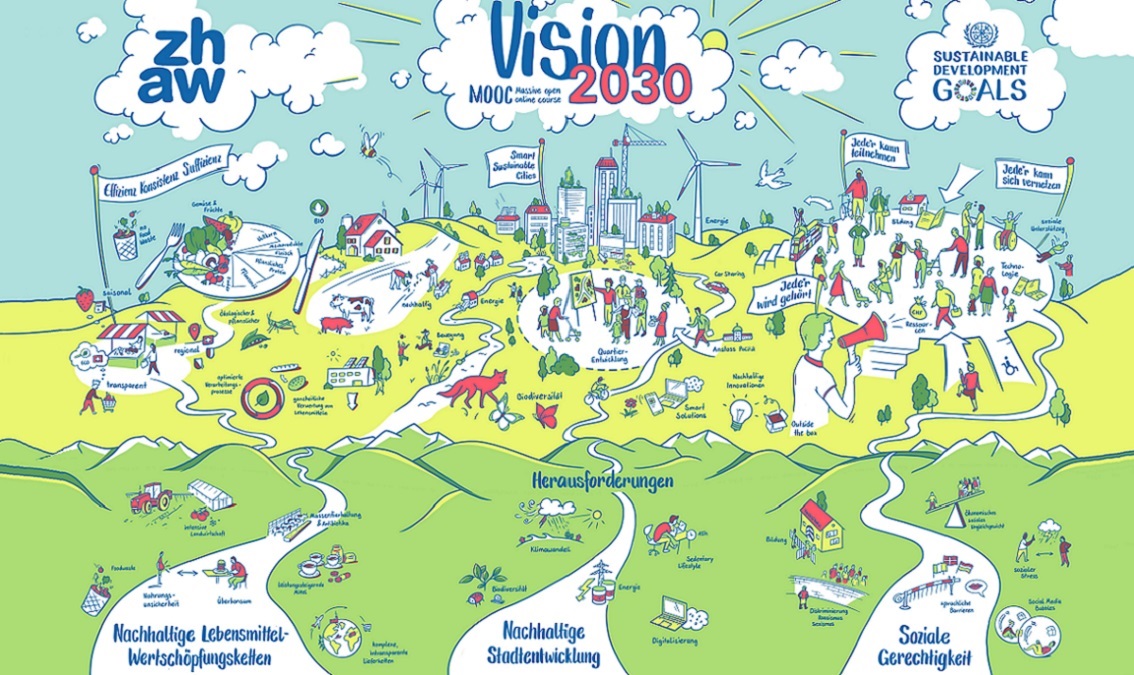About This Course
Humanity is facing major global challenges and contradictions: increasing prosperity, but also growing inequality; overconsumption on one hand, malnutrition on the other; increasing economic growth and extreme environmental degradation. We often lack a holistic view. Where can we start to solve these problems?
This course explains the most important global challenges and the possible solutions that already exist today:
• With a focus on food, urban development and social justice, you will get an overall view of our system. In the area of nutrition, you will learn about the entire food value chain and how to build sustainable food value chains through studies and examples.
• Cities are centres of human life. Experts from the fields of energy, architecture, natural resources and economics will show you how cities can be developed in a socially responsible, green and low-emission way.
• How does inequality arise and how can we do something about it? Experienced social scientists and linguists will explain how inequality arises and which principles can promote social justice.
• During the course, you will receive various inputs on how to deal with your own health in a sustainable way.
The Vision 2030 course will enable you to take a more holistic view of your work and life and thus contribute to sustainable development.
What you will learn
You will be able to explain
• what global challenges are and why they need to be looked at holistically.
• where food waste occurs and how it can be avoided.
• what principles promote social sustainability.
how cities can be developed into Smart Sustainable Cities.
You can describe
• what the causes and solutions are for the problem of land consumption.
• how life cycle assessments of food work.
• how nutrient cycles can be closed in cities.
• how inequality arises and can be combated.
You can share and justify your opinion on
• urban development projects on synergies and trade-offs within smart city concepts.
• existing social challenges and possible solutions.
• different concepts for more sustainable economic systems.
Course Staff
Dr. Claudia Müller
Dozentin und Forscherin für Lebensmittel-Technologie an der ZHAW, Departement für Life Sciences und Facility Management am Institut für Lebensmittel- und Getränkeinnovation at ZHAW
Dr. Claudia Müller ist Dozentin und Forscherin für Lebensmittel-Technologie. Ihre Lehr- und Forschungsschwerpunkte sind Ernährungserhebungen and Konsumverhalten, Verpflegung in der Gemeinschaftsgastronomie, Nachhaltige Wertschöpfungsketten und Food Waste.
Course Staff
Dr. Marina Petkova
Co-Studiengangleiterin Bachelor «Sprachliche Integration» an der ZHAW, Departement für Angewandte Linguistik, Institute of Language Competence (ILC) at ZHAW
Dr. Marina Petkova ist Dozentin und Co-Studiengangleiterin des Bachelors «Sprachliche Integration» am Institute of Language Competence, Departement für Angewandte Linguistik, ZHAW. Ihre Forschungstätigkeit umfasst Bereiche wie Mehrsprachigkeit und Sprachkontakt, sprachliche Variation, Interaktionsanalyse sowie Sprache und Raum.
Course Staff
Francesco Bortoluzzi
Leiter Nachhaltigkeitsprogramme an der ZHAW, Rektorat at ZHAW.
Francesco Bortoluzzi ist Leiter der Nachhaltigkeitsprogramme an der ZHAW, wo er die strategischen Programme für nachhaltige Entwicklung «ZHAW sustainable» leitet. Er ist ein erfahrener Spezialist für internationale Beziehungen und verfügt über weitreichende Erfahrungen im Projekt- und Programmmanagement für internationale Initiativen, akademische Beziehungen, nachhaltige Entwicklung und Mobilitätsprogramme in der Schweiz, Europa und den Vereinigten Staaten.
Course Staff
Sonja Feer
Wissenschaftliche Mitarbeiterin an der ZHAW, Departement Gesundheit am Institut für Public Health (IPH) at ZHAW.
Sonja Feer ist wissenschaftliche Mitarbeiterin an der Forschungsstelle für Public Health. In Ihrer Arbeit als Gesundheitswissenschaftlerin fokussiert sie das Themengebiet der Prävention und Gesundheitsförderung und ist bestrebt, die Gesundheit der Bevölkerung nachhaltig und zielgerichtet zu Stärken.
Course Staff
Leticia Müller
Forscherin mit Schwerpunkt auf nachhaltige Energiesysteme an der ZHAW School of Engineering am Institut für Nachhaltige Entwicklung (INE) at ZHAW.
Leticia Müller befasst sich an der ZHAW mit nachhaltigen Energiesystemen. Ihre Lehr- und Forschungstätigkeit beinhaltet Themen wie Smart Sustainable Cities and Regions, Dekarbonisierung von Energiesystemen und Reallabore.
Course Staff
Nico Frommherz
Leitung des MOOC Vision 2030 an der ZHAW, Rektorat at ZHAW
Nico Frommherz ist Leiter des MOOC Vision 2030 und arbeitet bei «ZHAW sustainable» an den strategischen Programmen für nachhaltige Entwicklung. Seine Schwerpunkte sind Naturmanagement, Umweltbildung, Nachhaltigkeitskommunikation und Erfassungsmethoden von Nachhaltigkeit in der Forschung.







